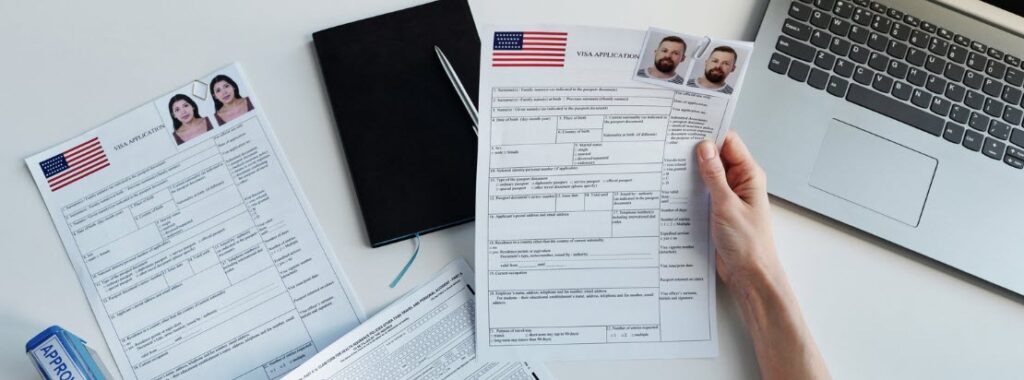Hey there travel enthusiasts and welcome to my post where we will try to answer a common question – do I need a visa to travel? Now, the answer here depends on a few factors including your destination country and the purpose of your trip. While some countries for example allow U.S. citizens to enter without a visa, others require one for entry or for certain types of travel, such as work or study.
To find out if you need a visa, start by checking with your local government foreign affairs department which will usually provide information on visa requirements as well as other important travel information such as safety and security, health conditions and local laws and customs.
Anyway, let’s check it all out in a little more detail below.
Understanding Visas
If you’re planning to travel abroad, one of the most important things you need to consider is whether or not you need a travel visa. A visa is a document that allows you to enter a foreign country and stay there for a specific period of time. Here’s what you need to know about visas:
Types of Visas
There are many different types of visas and the type you need will depend on your reason for traveling and the country you’re visiting. Some common types of visas include:
- Tourist Visa – A tourist visa is required if you are traveling for leisure or vacation purposes. This visa is usually valid for a short period of time, typically up to 90 days. Some countries may require you to show proof of sufficient funds, return tickets and accommodation arrangements as you enter the country as well.
- Business Visa – If you are traveling for business purposes, you may need a business visa. This visa allows you to attend meetings, conferences and other business-related events. You may also need to provide a letter of invitation from the company or organization you will be visiting.
- Transit Visa – If you are traveling through a country on your way to another destination, you may need a transit visa. This visa allows you to stay in the country for a short period of time, typically up to 72 hours. You will need to provide proof of onward travel and a valid visa for your final destination.
- Work Visa – If you are planning to work in a foreign country, you will need a work visa. This visa allows you to work legally in the country for a specific period of time and you may need to provide a job offer letter, proof of qualifications and a police clearance certificate etc.
- Student Visa – If you are planning to study abroad, you will need a student visa. This visa allows you to stay in the country for the duration of your course. You will need to provide proof of enrollment in a recognized educational institution and sufficient funds to support yourself during your stay.

Visa Requirements
Each country has its own visa requirements, and it’s important to research these requirements before you travel. Some countries require visas for all visitors, while others only require them for certain nationalities or types of travel. You can check the visa requirements for your destination country on the website of the country’s embassy or consulate.
Application
If you need a visa, you will need to apply for one before you travel. The application process can vary depending on the country you’re visiting, but it typically involves filling out an application form, providing supporting documents (such as a passport and proof of travel plans), and paying a fee. The processing time for a visa application can also vary, so it’s important to apply well in advance of your travel dates.
We will look at this in more detail below.
Visa Exemptions
Some countries have visa exemptions for certain nationalities or types of travel. For example, some countries allow citizens of certain countries to enter without a visa if they are staying for a short period of time or if they are traveling for a specific purpose (such as tourism or business). It’s important to check if you are eligible for a visa exemption before you travel, as this can save you time and money.
Do I Need a Visa to Travel?
When planning to travel abroad, one of the most important things to consider is whether or not you need a visa. Here are some factors to consider when determining if you need a visa:
- Country of Origin – Your country of origin is an important factor in determining whether or not you need a visa. Some countries have agreements with other countries that allow their citizens to travel without a visa, while others require visas for all foreign visitors.
- Destination Country – The destination country is also an important factor in determining whether or not you need a visa. Each country has its own visa requirements, and some countries require visas for all foreign visitors, while others only require visas for visitors from certain countries.
- Purpose of Travel – The purpose of your travel is also an important factor in determining whether or not you need a visa. Some countries have different visa requirements for tourists, students and business travelers, so it’s important to know what type of visa you need based on the purpose of your travel.
The simplest way I have found to determine whether or not you need a visa is to get online and type “do I need a visa to travel to xxx”. This search will usually take you to the relevant government websites that provide information on visa requirements for foreign citizens traveling into that country.
It’s important to note however that visa requirements can change at any time, so it’s important to check the latest information before you travel. Additionally, visa processing times can vary depending on the country, so it’s important to apply for your visa well in advance of your travel dates.

How to Apply for a Visa
If you are planning to travel abroad, you may need a visa to enter a foreign country. Here’s what you need to know about applying for a visa.
Documents Required
Before you apply for a visa, make sure you have the required documents. These need may vary depending on the country you are visiting and the type of visa you need however, some common documents required for a visa application include:
- A valid passport
- A completed visa application form
- Passport-sized photos
- Proof of travel arrangements, such as flight tickets or hotel reservations
- Proof of financial support, such as bank statements or pay stubs
- Proof of accommodation, such as a hotel booking confirmation
Make sure you check the specific requirements for the country you are visiting to ensure you have all the necessary documents before you apply.
Visa Application Process
Once you have all the required documents, you can start the visa application process. Here’s what you need to do:
- Find the nearest embassy or consulate of the country you are visiting. You can usually find this information on the country’s official government website – check here if you can apply online as well as this will save you a lot of time.
- Complete the online application form or download and complete the paper version. Make sure you fill out the form completely and accurately.
- Gather all the required documents and make copies of them.
- Submit your application and documents online or to the embassy or consulate. You may need to schedule an appointment for an interview or to submit your application in person.
- Pay the visa application fee. The fee amount may vary depending on the country you are visiting and the type of visa you need.
- Wait for your visa to be processed. The processing time may vary depending on the country you are visiting.
It is important to apply for your visa well in advance of your travel dates to allow enough time for processing. Make sure you check the specific requirements and processing times for the country you are visiting to ensure a smooth application process.
Possible Challenges in Visa Applications
When applying for a visa, there are several challenges that you may face. These challenges can make the visa application process more complicated and time-consuming. Here are some of the possible challenges you may encounter:
1. Meeting the Eligibility Criteria
The first challenge you may face is meeting the eligibility criteria for the visa you are applying for. Each country has its own set of eligibility criteria, and you must meet all of them to be considered for a visa. Some of the criteria may include:
- Having a valid passport – unually with at least 6 months validity from the time your trip ENDS
- Having a certain amount of funds in your bank account
- Having a return ticket
- Providing proof of accommodation
- Having a clean criminal record
2. Completing the Application Form
The visa application form can be lengthy and complicated and it is important to fill it out accurately and completely. Any errors or omissions may result in your application being rejected. Some of the information you may need to provide includes:
- Personal information (name, address, date of birth, etc.)
- Travel details (purpose of visit, length of stay, etc.)
- Employment information (employer name and address, job title, etc.)
- Financial information (income, expenses, etc.)
3. Providing Supporting Documents
Along with the application form, you will need to provide supporting documents to prove your eligibility for the visa. These documents may include:
- Passport
- Bank statements
- Employment letter
- Invitation letter
- Travel itinerary
- Hotel reservation
It is important to ensure that all the documents are genuine and up-to-date. Providing false or misleading information can result in your application being rejected and may have serious consequences.
4. Dealing with Delays and Rejections
Even if you meet all the eligibility criteria and provide all the necessary documents, there is still a chance that your visa application may be delayed or rejected. Delays may occur due to a high volume of applications or if additional information is required. Rejections may occur if you do not meet the eligibility criteria or if there are concerns about the authenticity of your documents.
In conclusion, applying for a visa can be a challenging process, but with proper preparation and attention to detail, you can increase your chances of success. It is important to be patient and persistent, and to seek professional help if needed.

What to Do if Visa is Denied
If your visa application is denied, it can be a frustrating and stressful experience. However, it is important to know that you do have options. Here are some steps you can take if your visa is denied:
- Understand the reason for the denial: Before taking any action, it is important to understand why your visa was denied. This information will be included in the denial letter you receive. Common reasons for denial include incomplete or inaccurate information, criminal history and insufficient ties to your home country.
- Consider your options: Depending on the reason for your denial, you may be able to reapply for your visa or appeal the decision. If you believe that the denial was based on incorrect information, you may be able to submit additional documentation to support your case. If you are not sure what your options are, you can consult with an immigration attorney or your country’s embassy or consulate.
- Reapply for your visa: If you are eligible to reapply for your visa, you will need to submit a new application and pay the application fee again. It is important to address the reason for your previous denial in your new application and provide any additional documentation that may support your case.
- Consider a waiver of inadmissibility: If you were denied a visa due to grounds of inadmissibility, such as a criminal record or previous immigration violations, you may be eligible for a waiver. Waivers are granted on a case-by-case basis and require a separate application process.
- Consider alternative travel options: If your visa is denied and you are unable to reapply or obtain a waiver, you may need to consider alternative travel options. Depending on your situation, this may include postponing your travel plans, traveling to a different country, or exploring other visa options such as a student or work visa.
Remember, a visa denial is not the end of the road. By understanding your options and taking the appropriate steps, you can still achieve your travel goals.
Conclusion
There you have it, my answer to the question of whether you need a visa to travel. I hope it has been helpful and as usual, please let me know of your experiences here or if there are any other information that I need to add.
Also, please do not hesitate to comment below if you have any questions, concerns, or corrections or would like me to check anything else out for you.
Until next time.
Have fun
Paul






